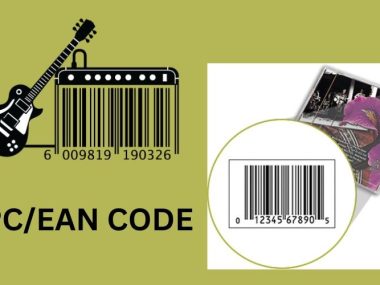It’s no secret that the world of music is full of elusive terms that can be tricky to define. I’m not only talking about music theory, but even the industry as a whole has many titles and words that may seem simple at first, yet they get more complicated as you take a closer look.
Possibly one of the most confusing terms when it comes to jobs in the music sector is a producer. This is one of those things you think you know until you’re hit with dozens of definitions for it and you don’t really know anymore.
This is where I come in. I’m here to give you a definitive answer to the question, “what is a producer in music and what do they do?”. I’ll be explaining what the job is, what responsibilities it entails, how much money it pays, and much more.
What Is a Producer in Music and What Do They Do?
Also known as a record producer, a music producer is someone who assists an artist with recording music by guiding their sound throughout the project. The ultimate goal of a producer is to bring the artist’s vision to life in the best way possible.
There are multiple types of music producers out there with slightly varying roles, but the job generally entails responsibilities such as shaping music into a refined product, schedule recording sessions within the appropriate budget, as well as supervising the general performance to make sure it’s up to par.
Explaining Music Production
As you can tell by now, being a music producer isn’t your typical job in the music field — not that the industry has many of those. The unique thing about the job of a record or music producer is that what they create isn’t something you can touch or see because, well, it’s not an object, to begin with.
If we take a step back to look at what a producer in music does for a living, they essentially arrange for air molecules to vibrate in a certain way so that when they come in contact with another human, that person hears and feels what the artist wants.
You may be thinking this job description is exaggerated a bit, but if you think about the very nature of music production, you’ll find that it makes sense. Music production is the process of creating, manipulating, recording, and preserving music in a form that labels/individuals can distribute and listeners can enjoy.

In fact, any piece of recorded music that we know and love today -whether it’s popular or underground- exists thanks to the process of music production. It also doesn’t matter how maximalist or minimalist the recording sounds, it’s out there because of a music producer.
To enter the world of professional music production, you need to possess both creative and technical skills. Additionally, you should have a good capacity for listening, well-developed knowledge of recording technologies, solid leadership and project management skills, and of course, deep musical understanding.
If you’re thinking about becoming a music or record producer, this article offers some crucial and valuable information that you should consider.
What Does the Job of a Music Producer Entail?
The job of a record or music producer has always carried a certain level of vagueness, mainly because producers could be doing so many things that it becomes hard to know where it all starts and ends.
It’s true, just by asking a few friends “what does a producer in music do?”, I got several answers including:
- They’re someone who plays bass, programs the beat for songs, and co-writes them.
- They’re someone who gets labels to sign artists.
- They’re someone who schedules recording sessions, coordinates meetings, and takes phone calls.
- They’re someone who mediates and resolves disputes between members of a band.
As such, it’s safe to say that a music producer plays many different roles. Below, I’ll discuss in more detail the 4 most vital roles of a record producer:
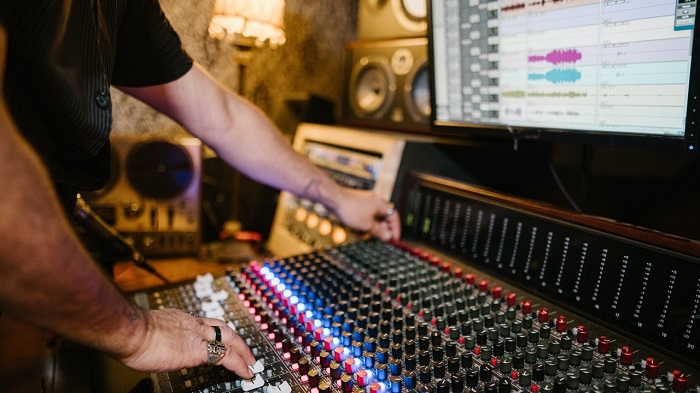
1. Transforming Raw Music into an Artistic and Commercial Product
The first and most common role of a music producer is to give the artist’s music its final shape. It’s the process through which the producer takes the rough musical material of a song and changes it into a finished artistic and commercial recording.
This role requires creativity as much as it demands knowledge of the market. The producer must be able to express the musical and emotional vision of the artist while ensuring that the recording gets heard by a wide audience.
According to legendary record producer Sir George Martin, a music producer is a person who actually puts all the musical material into the final frame and presents it to the public saying “This is what it is”. In other words, it’s the taste of the producer that makes a song into what it is.
2. Scheduling Recording Sessions Within an Agreed-Upon Budget
The second responsibility of a producer in music revolves around scheduling recording sessions while making sure not to go beyond the appointed budget. As such, the producer is in charge of leading the artists/musicians through an efficient recording plan to make sure that the project achieves successful artistic and technical completion.
In more ways than one, this particular role is one of the most important reasons the job of a record producer is a thing. The greatest producers in music have proven through their work that they’re capable of putting together a successful, professional-grade record and providing the final product on the due date agreed upon in the contract.
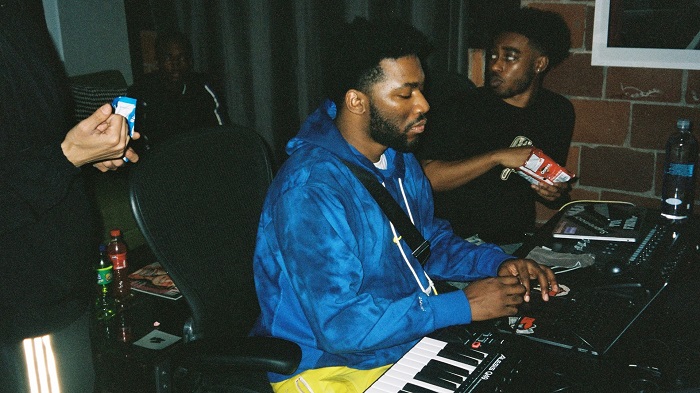
The completion deadline is a critical point in a much bigger timeline developed by labels -major or small- for their commercial recording projects. This grand timeline or schedule includes other crucial steps for the success of the record such as marketing and publicity plans that coordinate promotions and launching dates for the record’s release.
If we’re talking about a personal, indie, or a generally lower-budget project, including an experienced music producer as part of the team to supervise completion is a smart move, not only to be on time and budget.
They’ll be able to, for example, convince the artist that more overdubbing isn’t necessary or advise them against endless remixing, which are two of the most common reasons why many records end up never seeing daylight.
3. Getting the Best Possible Performance Out of the Artists
Another part of a music producer’s job is to know how to get their artist to perform as best as they possibly can, be it a solo artist or a band. There’s a general assumption in the music production world that if what you hear appeals to you, then it’ll appeal to other listeners as well.
For this reason, having excellent musical instinct and trusting your emotional response is a very important part of being a record producer. It’s all about being confident enough to say when you like and don’t like a sound.
These aspects are equally crucial to apply during just about every stage of the production process from deciding that the feel and energy of the performance of a specific backing track are right, to approving a guitar solo, to combining all the sounds played by the various instruments. The ultimate judgment comes down to what the producer thinks and feels.
4. Achieving the Ideal Balance between Creativity and Business

Last but not least, a music or record producer has to be able to achieve and maintain the delicate balance between the creative elements of making music and the business demands of the work. A skilled producer will master the art of striking a balance between these two contrasting sides.
How can they do it? Well, I have two words for you: the vibe. By manipulating this amorphous concept that artists seem to adore so much, a music producer can get the job done.
To establish a good vibe for your artists, the first thing you should do is pretend that you’re all there to just play around and record the results. A huge part of this step involves making the recording operation as subtle as you can.
Of course, as the producer, you’d be very aware of the type and amount of work that has to be completed during each session. However, you won’t share those thoughts out loud, so you’re kind of a silent director that still gets the job done.
The general attitude you should adopt is “I’m just the person behind the curtain, pay no attention to me”. Keeping this in mind, here are a few strategies you can try to formulate “the vibe”:
- Create a positive atmosphere — for a recording session to be fun and laid back, it has to be built around optimism, positivity, and team spirit. With the music producer being the leader/coach of the entire process, creating such a positive environment starts with them.
- If the producer walks in with a generally agreeable state of mind, others in the room will jump on the positive vibe wagon (as long as you all agree that having fun with it is the ultimate goal). On the other hand, a negative attitude can ruin a session and stop it dead in tracks.
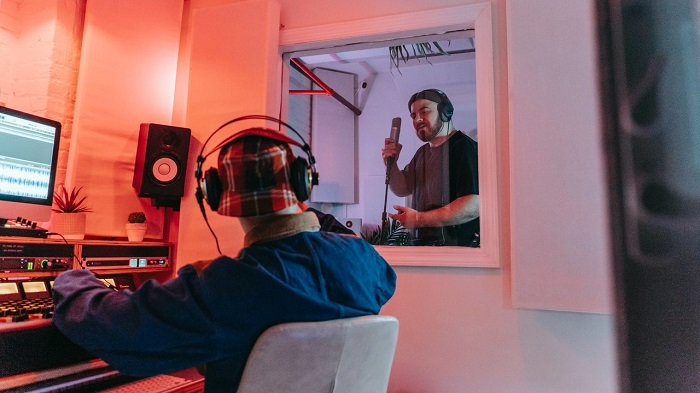
- Lead with confidence — I hinted at this before and I’ll say it again. Having confidence in your skills is a crucial aspect of being a successful music producer. It makes you fit to lead, to inspire, and to reassure your team that it’s all going to turn out okay.
- If a music producer is experienced, well-prepared, and knows what it takes to complete each phase of the recording process, they’ll have the necessary confidence to do everything else.
- Keep the show going — ask any successful music producer and they’ll tell you, continuing to move forward is key to a thriving production process. The operation must keep moving to preserve its momentum, otherwise, there’s a risk of becoming too far behind on schedule.
- Producers should steer the process to quickly go from one task to the following, creating an active flow that results in generating a pleasant vibe.
- Emphasize the joy of recording — oftentimes, the music producer is the one who reminds other members of the team why they’re doing what they’re doing in the first place. Never losing sight of how much joy making music offers can make or break recording sessions.
- A great producer knows that each session is a privilege and makes sure everybody else is grateful for the opportunity, which sets the scene for a fun and uplifting vibe.
What are the Types of Producers in Music?
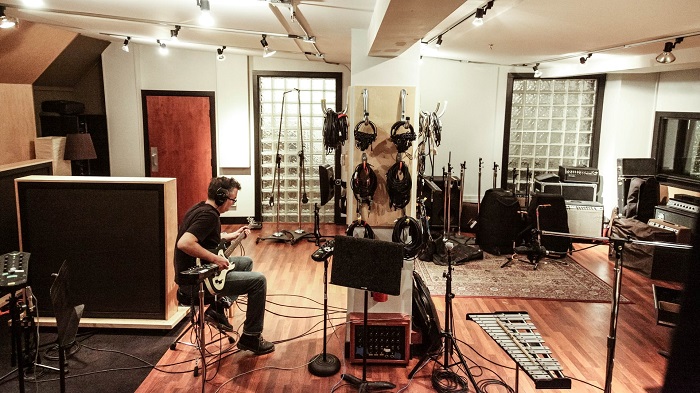
Almost every recording artist out there has partnered with a grade-A producer who isn’t only highly experienced and equipped in the art of music production but also has deep knowledge of the leadership and business side of the process.
So, how do you pick the right producer to work with or become? Well, here’s a rundown of the 5 most common types of producers in music:
- The engineering producer — this is the most stereotypical type of producer that people think of when asked to envision what a record producer working in a studio is like. The engineering producer adopts a hands-on approach to the production process as they work “hunching” over the soundboard, adjusting audio elements such as equalization, compression, and reverb tails.
- This type of producer will have a solid knowledge of the technical side of the recording process. Chances are they started as an audio engineer before climbing the ladder to become a record producer.
- The “golden ticket” producer — this type of producer is said to have a magic touch; any record or artist they pick up just makes it in the business. The “golden ticket” producer possesses a proven record of success with almost any artist they work with.
- This “magic touch” could be because of the producer’s networking ability and having solid connections with other professionals in the industry, their management system in the studio, or their “ear” for music trends. A prime example here is Dr.Dre who is pretty much a “golden ticket” for any artist who works with him.
- The mentor producer — this type of producer probably is or has been a recording artist themselves, and consequently, they often fully understand the vision and needs of the artist. This allows them to act as a mentor to the artist throughout the recording process, knowing when to provide motivation, coaching, and support so the artist performs as best as they’re capable of.
- The mentor producer usually has a history of recording music that seems to give them the ability to contribute with fresh insight and spot the strengths of different artists.

- The musician-producer — the musician-producer is first and foremost a musician. Their motto is “once a musician, always a musician”, so you’ll find them very involved in the recording process for their artists, probably playing instruments and adding their touch to the general orchestration of the sound.
- A spot-on example of a musician-producer is Trevor Horn, who isn’t just a Grammy winner but also the holder of the title “The Man Who Invented the Eighties” thanks to his unparalleled influence on pop music during that era.
- The artist-producer — when the artist assumes total control over their tracks and songs, this makes them a producer as well. As such, this type of producer is usually an artist who has a bunch of hits to their name as well as solid experience in producing and recording. Famous examples of artist-producers are Prince and Kanye West.
How Does a Producer Make Music?
There are various forms in which a musical idea can manifest. It can be as simple as a bass pattern that completes a track or as complex as chord changes and heavy audio adjustment.
What we’re concerned with today is how the finished product gets its sound, which mostly depends on the musical arrangement and the production tools that a record producer brings to the table.
So, how does a producer make music? The steps below will give you a brief idea of what happens when producing a piece of music:
1. Picking Ideas and Assigning Parts
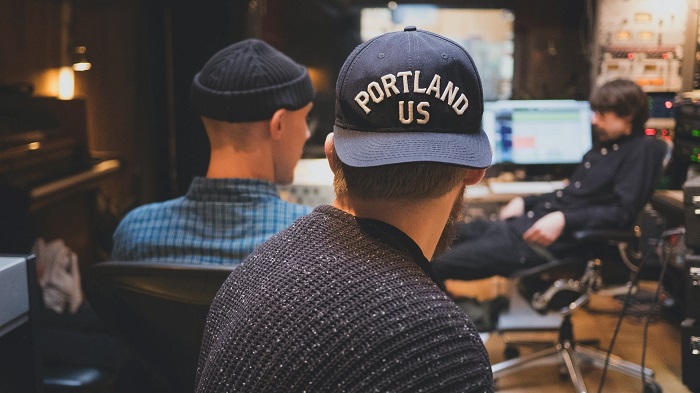
The first step is choosing the song to be produced and the instruments to be used in the arrangement. The producer gets to decide which parts of the track will be recorded and choose the players.
2. Recording and Editing
The producer records the performances of artists that make up the musical arrangement. A range of hardware equipment and software tools are involved in this step.
Once all the recording is complete, the producer edits the performances using MIDI sequencing or other tools. This enables them to combine and turn individual performances into a cohesive arrangement.
3. Mixing and Mastering
Now, the producer takes individual tracks and processes them using certain effects to form a final stereo mix of the recording.
Finally, the producer takes the finished stereo version and prepares it for distribution as a digital audio file or a CD by fine-tuning the overall sound of the song.

